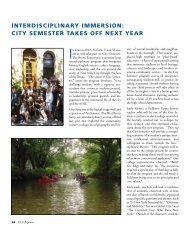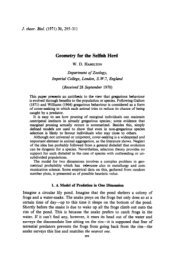Chapter 6 - Ethical Culture Fieldston School
Chapter 6 - Ethical Culture Fieldston School
Chapter 6 - Ethical Culture Fieldston School
Create successful ePaper yourself
Turn your PDF publications into a flip-book with our unique Google optimized e-Paper software.
“Mr. Sinatra Gets Rejected”<br />
importantly, you are not alone in feeling foolish for wanting things you had no<br />
real right to expect, but could not help but want anyway. The best popular music<br />
makes the world a bigger place, not simply by validating common feelings<br />
(though that inevitably is what attracts most listeners), but also by illuminating<br />
an unseen community and tapping the wellsprings of empathy.<br />
In short, Sinatra’s performance in “I’m a Fool to Want You” is a<br />
profoundly creative act, one that falls more into the realm of character than<br />
personality. He took the pain of an unrealized longing and shaped it not only<br />
into an experience that could be shared, but one whose beauty transcends the<br />
pain that inheres in it (in a manner not unlike Anne Bradstreet’s lament for a<br />
house that burned down, another experience of loss that was transformed into a<br />
work of art). Maybe it isn’t surprising that as Sinatra grew older, he seemed to<br />
become increasingly less interested in performing such productive work.<br />
Destroying things is sometimes an easier way to deal with frustration than<br />
making things.<br />
So we probably shouldn’t blame him for wielding that sledgehammer. It’s<br />
enough that some of the time, anyway, he gave us a love that’s there for others<br />
too.<br />
American History for Cynical Beginners<br />
34
















